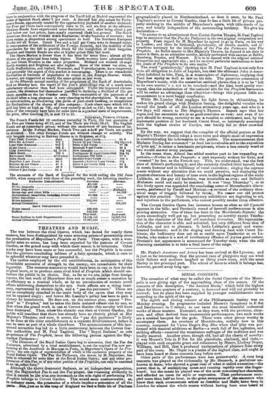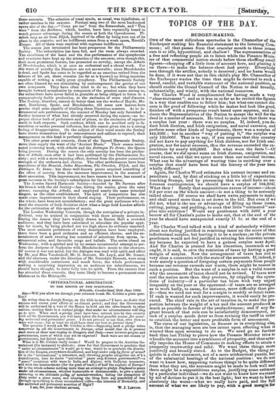SERIAL CONCERTS.
The cessation of what may be called the Serial Concerts of the Metro- polis is now giving sign of the approaching close of the season. Of the concerts of this description, "the Ancient' Music," _ which held the highest place for three-quarters of a century, is deceased and will not probably be revived; but its place has been supplied by yowler establishments, more according to the spirit of the age. .
The eighth and closing concert: of the Philharmonic Society was on Monday evening. Its programme included Mozart's Symphony in E flat and Beethoven's in C minor; to our 'taste the most beautiful orchestral works of those masters. Executed, as they were, with the preeision, clear- ness, and effect derived from innumerable performances; two such works are a musical banquet for the gods. ! There were other' pieties- worthy to accompany then,. An overture of Mendelesohn, 'entirely;:fiew In this country, composed for Victor Hugis's Buy Bias when that 'play was per- formed with-musical additions at Berlin—a work full of fire,ngitation, and striking effects—received the unanimous suffrages of the audience and was loudly encored. Another piece, though old, had all the charm of novelty; it was Mozaree Trio in E flat for Gm pianoforte, elariolieCand played with such exquisite grace and refieeMent by Messrs, Lindsay' SI oper, Williams,' and Hill, that, it produced excliniations of jil,*tire from every wt of the room. Mr:'Sloper: isa Pianist of the highest class, and ought to have been heard at these concerts Agog before no*. Other parts of the performance were less praiseworthy. A very long concertowas played on the violoncelio. by Mr. Hancock, a. performer un- known to, fame; .who showed a great deal of what is oalled execution—the power, that is,..of multiplying -noteaand running rapidly-over the finger- board; but the-mnsic-he played was of the mon'eonanionplace character, and afforded no room for style or expression. That performance occu- pied more than half-an hour, to the great annoyance of the amateurs who knew that .suck_ conitimmate artists as Joachim and Halle, have been in ,London for almost the whole season without having been once heard at these concerts. The selection of vocal music, as usual, was injudicious, or rather careless in the extreme. Persiani sang two of the most hackneyed opera airs of the day,—" Come per me" from the Sonnambula, and 'Una voce" from the Darbiere.' which, besides, have been repeatedly heard to much greater advantage during the season at both the Operahouses. Pi- schek sang an air from Elijah, deprived of its effect by being torn out of its place in the oratorio; and an indifferent scene from a weak opera,Herold's Zampa. All of them were received with supreme indifference. The season just terminated has been prosperous for the Philharmonic Society. The subscription has been full, and the room always crowded. The excellence of the band and the fine performance of the symphonies and overtures have kept up the attraction of the concerts, even though this, their most prominent feature, has presented no novelty, except the Athalie of Mendelssohn, which is at once an orchestral and a choral work. For this want of novelty the Directors are not answerable: since Mendelssohn is dead, and Spobr has come to be regarded as an emeritus retired from the hbours of his art, there remains (as far as isinowri) no living musician Capable of writing a really great symphony. The Philharmonic Society are often blamed for not stimulating by encouragement the genius of our own composers. They have often tried to 'do so; but when they have brought fortvard symphonies by composers of the greatest name among us, the subscribers have never failed to grumble at being obliged to listen to a comparatively feeble production, to the exelusion of some chef-d'reavre. The Society, therefore, cannot do better than use the works of Haydn, Mo- start, Beethoven, Spohr, and Mendelssohn, till some new heaven-born genius shall arise capable of rivalling these illustrious masters. As to in- atrumental solo performances, the concert of Monday last only furnished a further instance of what had already occurred during the season—an im- proper choice both of performers and of pieces, to the exclusion of superior merit in both respects. Such conduct, which can be ascribed only to fa- vouritism or undue personal influence, has this season given rise to a strong feeling of disapprobation. On the subject of their vocal music the Society bave shown themselves deaf to remonstrance and callous to-reproof; their Management on this head is perfectly disgraceful.
The other great serial concerts, those of the Sacred Harmonic Society, more than supply the want of the "Ancient Music." Their season termi- nated yesterday week, with Athalie and the Dettingen Te Deem; the Queen being present. During the season the only novelty has been the produc- tion of Athalie, soon after it had been performed by the Philharmonic So- ciety; and with a more imposing effect, derived from the greater numerical strength of the orchestra and chorus. The other performances have been repetitions of the Messiah, Judas Maccabeus, The Creation, Elijah, and the Dettingen Te hewn: but these well-known pieces acquired something of the effect of novelty from the immense improvement in the manner of their execution. This improvement, we have reason to know, has caused a great increase in the Society's subscription for the past season.
The London Sacred Harmonic Society—founded by Mr. Surman after his breach with the old Society—has, during the season, given the same pieces, excepting the Athalie, and employed nearly the same principal wingers, as the other establishment. The spirit of competition has also made some improvement in their choral singing. Their performances,'on the whole, have been not unsatisfactory; and the great audiences who at- tend the concerts of both Societies show what a large field London affords for the cultivation of this species of music.
The London Wednesday Concerto, though the enterprise of a private in- aividual, may be noticed in conjunction with those already mentioned. During the season they have weekly drawn to Exeter Hall a crowded audience; and they have been calculated to stimulate the popular appe- tite for music, by being pitched not too high above its ordinary standard. The most eminent performers of every description have been employed; there have been a good orchestra and an efficient chorus; and the en- tertainment of each evening has consisted of selections from operas, in- strumental solos, and favourite songs and ballads. The series closed on Wednesday, with a spirited and by no means unsuccessful attempt to per- form the Antigone of Sophocles with Mendelssohn's music to the choruses. Of course it was not acted, but the dialogue was read with spirit and effect by Mr. and Miss Vandenhoff; Mr. G. Bennett, Mr. Loyd, and Mr. Stuart; gnd the choruses, under the direction of Mr. Sterndale Bennett, were sung with considerable correctness and much force; the whole performance 'making a surprising impression on an audience too miscellaneous, we should have thought, to enter fully into its spirit. From the success that has attended these concerts, they seem likely to become a permanent esta- blishment in the Metropolis.



























 Previous page
Previous page